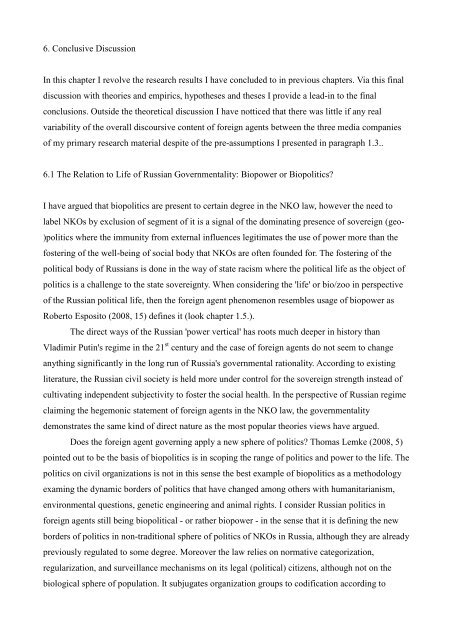Foreign Agents in Russia - Doria
Foreign Agents in Russia - Doria
Foreign Agents in Russia - Doria
Create successful ePaper yourself
Turn your PDF publications into a flip-book with our unique Google optimized e-Paper software.
6. Conclusive Discussion<br />
88<br />
In this chapter I revolve the research results I have concluded to <strong>in</strong> previous chapters. Via this f<strong>in</strong>al<br />
discussion with theories and empirics, hypotheses and theses I provide a lead-<strong>in</strong> to the f<strong>in</strong>al<br />
conclusions. Outside the theoretical discussion I have notticed that there was little if any real<br />
variability of the overall discoursive content of foreign agents between the three media companies<br />
of my primary research material despite of the pre-assumptions I presented <strong>in</strong> paragraph 1.3..<br />
6.1 The Relation to Life of <strong>Russia</strong>n Governmentality: Biopower or Biopolitics?<br />
I have argued that biopolitics are present to certa<strong>in</strong> degree <strong>in</strong> the NKO law, however the need to<br />
label NKOs by exclusion of segment of it is a signal of the dom<strong>in</strong>at<strong>in</strong>g presence of sovereign (geo-<br />
)politics where the immunity from external <strong>in</strong>fluences legitimates the use of power more than the<br />
foster<strong>in</strong>g of the well-be<strong>in</strong>g of social body that NKOs are often founded for. The foster<strong>in</strong>g of the<br />
political body of <strong>Russia</strong>ns is done <strong>in</strong> the way of state racism where the political life as the object of<br />
politics is a challenge to the state sovereignty. When consider<strong>in</strong>g the 'life' or bio/zoo <strong>in</strong> perspective<br />
of the <strong>Russia</strong>n political life, then the foreign agent phenomenon resembles usage of biopower as<br />
Roberto Esposito (2008, 15) def<strong>in</strong>es it (look chapter 1.5.).<br />
The direct ways of the <strong>Russia</strong>n 'power vertical' has roots much deeper <strong>in</strong> history than<br />
Vladimir Put<strong>in</strong>'s regime <strong>in</strong> the 21 st century and the case of foreign agents do not seem to change<br />
anyth<strong>in</strong>g significantly <strong>in</strong> the long run of <strong>Russia</strong>'s governmental rationality. Accord<strong>in</strong>g to exist<strong>in</strong>g<br />
literature, the <strong>Russia</strong>n civil society is held more under control for the sovereign strength <strong>in</strong>stead of<br />
cultivat<strong>in</strong>g <strong>in</strong>dependent subjectivity to foster the social health. In the perspective of <strong>Russia</strong>n regime<br />
claim<strong>in</strong>g the hegemonic statement of foreign agents <strong>in</strong> the NKO law, the governmentality<br />
demonstrates the same k<strong>in</strong>d of direct nature as the most popular theories views have argued.<br />
Does the foreign agent govern<strong>in</strong>g apply a new sphere of politics? Thomas Lemke (2008, 5)<br />
po<strong>in</strong>ted out to be the basis of biopolitics is <strong>in</strong> scop<strong>in</strong>g the range of politics and power to the life. The<br />
politics on civil organizations is not <strong>in</strong> this sense the best example of biopolitics as a methodology<br />
exam<strong>in</strong>g the dynamic borders of politics that have changed among others with humanitarianism,<br />
environmental questions, genetic eng<strong>in</strong>eer<strong>in</strong>g and animal rights. I consider <strong>Russia</strong>n politics <strong>in</strong><br />
foreign agents still be<strong>in</strong>g biopolitical - or rather biopower - <strong>in</strong> the sense that it is def<strong>in</strong><strong>in</strong>g the new<br />
borders of politics <strong>in</strong> non-traditional sphere of politics of NKOs <strong>in</strong> <strong>Russia</strong>, although they are already<br />
previously regulated to some degree. Moreover the law relies on normative categorization,<br />
regularization, and surveillance mechanisms on its legal (political) citizens, although not on the<br />
biological sphere of population. It subjugates organization groups to codification accord<strong>in</strong>g to
















